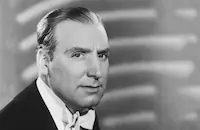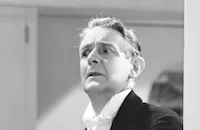Yokel Boy
Cast & Crew
Joseph Santley
Albert Dekker
Joan Davis
Eddie Foy Jr.
Alan Mowbray
Roscoe Karns
Film Details
Technical Specs

Synopsis
In Hollywood at Mammoth Studios, executive producer R. B. Harris complains to publicist Al Devers that the studio is not receiving enough attention in the press and that the New York office is pressuring him to come up with a hit film. Soon after, Al finds a newspaper report about Joe Ruddy of Emoryville, Kansas, who has been nominated "Public Picture Fan #1" because he has seen hundreds of films and is also able to estimate attendance figures at his local theaters. Harris invites Joe to Hollywood to advise the studio on which films to produce and assigns his cousin, would-be actress Vera Valaine, to vamp Joe. At a press conference to welcome him, Joe is asked who he regards as a Hollywood glamor girl, and he names Vera the "Wow" girl and obliges Harris to cast her as the lead in a new gangster movie, King of Crime . However, Rod La Tour, the male lead, refuses to work with Vera and walks off the set. After Joe suggests to Harris that he hire a real gangster, Bugsie Malone, to play the lead, Harris sends him to Chicago to contact Malone. Joe goes to the nightclub where Bugsie's sister Molly entertains and talks her into helping him persuade Bugsie to do the picture. When Bugsie arrives, accompanied by sidekicks "The Professor" and Trigger, he reveals that Molly has been holding a million dollars for him but refuses to hand it over unless he reforms. Joe eventually makes his pitch and Bugsie's vanity about starring in his own life story causes him to accept. Joe, Bugsie, Molly and the others head for Hollywood, where Bugsie installs himself in Harris' mansion. At the studio, Bugsie takes over and refuses to accept the script because in it the police win, and declares that he wants Molly to play his sister. The film starts production and Bugsie, bored with the slow pace, rewrites scene after scene. On the eighth day of shooting, when Molly is to perform a death-bed scene, Vera shows up expecting to play the scene and is furious to discover that she has been replaced. Immediately after Molly "dies," Amatoff, the film's director, is stunned by the entrance of a ten-girl dance routine which Bugsie has inserted in the script. Molly then "revives" and launches into a comedy dance routine. Later, Joe discovers that Molly is in love with him and tries to stall when Bugsie insists that they get married. Further complications arise when Harris' boss Johnson flies in from New York to find out why the picture is delayed and overbudget. Meanwhile, at a dude ranch in Palm Springs, Bugsie and his pals are relaxing until Johnson and Harris show up. Bugsie threatens Johnson and chases him off, whereupon Johnson removes his backing for the production. Harris wants to continue, however, and Joe arranges for a bank robbery sequence to be photographed at a real bank, as Harris cannot afford to build a set. When The Professor and Trigger are cast as Bugsie's henchmen and decide to rob the bank for real, Joe overhears their plan, but they catch him and tie him up. Unknown to Bugsie, they escape with $50,000. Molly, meanwhile, has been hit by a mike boom and is in a coma. Bugsie offers Harris the million dollars Molly is holding to pay back the bank and finish the picture. However, Molly now has amnesia and has reverted to childhood, but they try to get her to tell where she has hidden the cash. When Molly receives another bump on the head, she recovers her memory and hands over the money. Later, after The Professor and Trigger have been caught and the production is completed, Bugsie and Molly leave for the East by train. As the train pulls out, Bugsie pulls Joe on board and surprises him with a minister and witnesses, and he and Molly are married.

Director

Joseph Santley
Cast

Albert Dekker

Joan Davis
Eddie Foy Jr.

Alan Mowbray
Roscoe Karns
Mikhail Rasumny

Lynne Carver
Marc Lawrence
Tom Dugan

Pierre Watkin
James C. Morton
Marilyn Hare
Florence Wright
John Holland
Paul Scott

Charles Lane
Cy Ring
Hal Cooke
Betty Blythe

Leonard Carey
Charles Coleman
Roger Kirby

Arthur O'connell

Lois Collier
Irene Shirley
Cecil Weston
Mel Ruick

Fern Emmett
Dick Elliott
Robert Homans
James Farley
Ken Christy
Bud Jamison
William Pagan
Jack Cheatham
Charles Quigley
Tim Ryan
Frank E. Farr

George O'hanlon
Jack Rice
Ralph Mccullough
Harry Hayden
Fred Santley
Harry C. Bradley
Mady Laurence

Anne Jeffreys

Emmett Vogan
Charles Hall
Crew
Lew Brown
Louis Da Pron
Isabel Dawn
Cy Feuer
Arthur V. Jones
Russell Kimball
Harry Knight
Max Lief
Edward Mann
Sol Meyer
Ernest Miller
Robert North
Adele Palmer
Caesar Petrillo
Gene Rose
Russell Rouse
Milton Samuels
Murray Seldeen
Nelson Shawn
Sam H. Stept
Charles Tobias

Film Details
Technical Specs

Quotes
Trivia
Notes
The file for this film at the AMPAS Library contains a memo from a Republic executive attached to the Screen Achievements Bulletin. The memo states that the studio bought the musical play Yokel Boy, which starred Judy Canova and Buddy Ebsen in New York, but used neither its plot nor its characters in the film. An unpublished story by Russell Rouse was the sole basis for the picture, and the film contains only two songs from the musical, "It's Me Again" and "Comes Love." An January 18, 1942 New York Times article reported that the true inspiration for the picture was real-life movie fan Private Kenneth Wilkinson, who had seen 312 films in less than a year. According to Hollywood Reporter news items, Robert Lively, Jack Townley and Hal Long were all assigned to work on the picture's screenplay. The extent of their contributions to the completed film, if any, has not been determined.
According to a May 27, 1941 Hollywood Reporter news item, when Republic purchased the screen rights to the play, original star Buddy Ebsen was being considered to reprise his role for the film. A May 27, 1941 Los Angeles Examiner news item reported that Lois January, one of Ebsen's Broadway co-stars, was also being considered for the film, and the Variety review noted that the play had originally been purchased as a screen vehicle for Judy Canova. According to Hollywood Reporter news items, Broadway actress Betty Keane was to make her motion picture debut in the role of "Molly Malone," but was replaced by Joan Davis after severely spraining her ankle. Production on the film was suspended from January 8, 1942 to January 14, 1942 while Davis prepared to take over Keane's part. Albert Dekker and Mikhail Rasumny were borrowed from Paramount for the picture.












